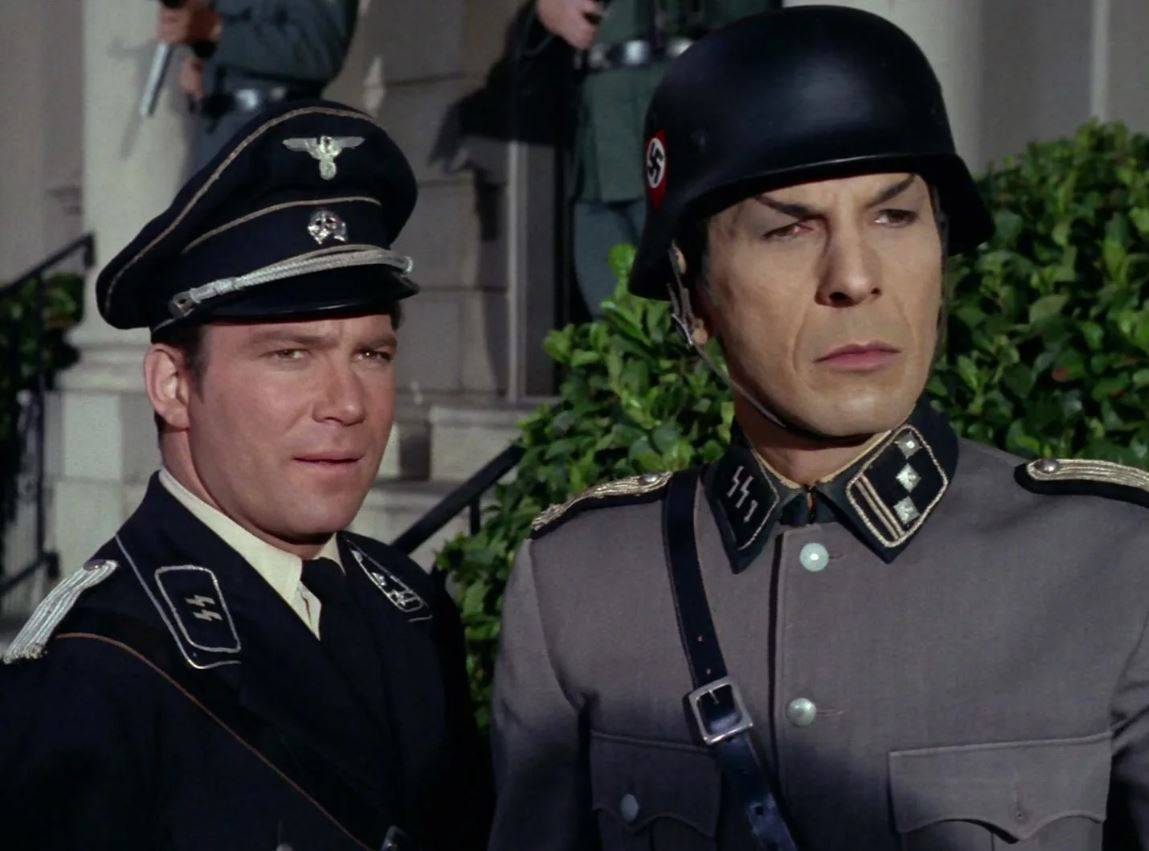Is it okay to admire just the “good” elements of nazism? Star Trek had an episode, Patterns of Force, that attempted to answer this exact question. Kirk and Spock arrive on a planet to discover that a rogue Federation officer has established himself as dictator over the natives in an attempt to create a good nazi society with only the positive elements of nazi ideology. However, the experiment is no longer under his control, and the natives are planning to attack the neighboring planet and destroy everyone on it.
This was the WWII generation and Star Trek took itself seriously with hard-hitting topics like this one. However, Patterns of Force just falls short. For one, the neighboring planet, “Zaon,” is a stand-in for Jews. Okay, but if they were going to take the “WWII nazis” analogy to its logical conclusion, the neighboring planet should have been communists. But of course, portraying the Soviet Union in a positive light just wasn’t allowed on American television. And yes that’s more than a bit ironic for a show attempting to dissect nazism.
And that’s the fundamental problem with Patterns of Force. It would be great to portray the nazi planet as hysterically afraid of the neighboring “subhuman slave race” invading them and taking away all their precious democracy. “We have to attack them before they attack us!” But that’s literally what was happening again in the Cold War. You can’t really throw stones at Nazi Germany when you’re doing the same thing.
Patterns of Force wasn’t allowed to actually discuss what being a nazi means – so it just portrays nazis as generically evil cartoon villains with cool uniforms. That is particularly troubling for a show watched by millions of children and young adults. “You shouldn’t be a nazi because nazis are bad” is the moral of this story, and it’s disappointing.
Furthermore, this generic evilness undermines the episode’s own message. The rogue Federation officer is portrayed as having good intentions, but he was drugged by one of his subordinates who decides to start the war. So… why did this nazi regime turn bad? Because a bad guy took over? Then it didn’t actually matter if the planet was nazi or not, the problem was that one guy who was bad.
Patterns of Force could have done something more nuanced. This benevolent Hitler figure came to a planet and built a great civilization, telling them that this is the greatest, most exceptional and democratic civilization to ever exist and better than all the other ones. The natives, completely on their own, decide that this means they are superior to the neighboring race, and need to destroy them before they grow too numerous. Hitler is upset and tries to stop them – but the natives accuse him of being a “ruskie lover” and throw him in jail.
I think that would be a much better story, but of course it wouldn’t have been allowed in the Cold War.
Ian Kummer

Support my work by making a contribution through Boosty
All text in Reading Junkie posts are free to share or republish without permission, and I highly encourage my fellow bloggers to do so. Please be courteous and link back to the original.
I now have a new YouTube channel that I will use to upload videos from my travels around Russia. Expect new content there soon. Please give me a follow here.
Also feel free to connect with me on Quora (I sometimes share unique articles there).



The original Star Trek only lasted 2½ TV years. So Kirk and Spock are still the same age, around 30? One actor is now deceased and the other is now 100 and actually made it to space. I missed several shows since the adults preferred “Return to Paper Plates”, but I watched reruns of the reruns for about 10 years until they disappeared. Didn’t bother with the movies or the spin-offs.
Nazis always get portrayed in ways useful to our NATO leadership. The actual Nazis divided all Europe into three races: Aryans, the Master Race, Jews who should all be deported somewhere, preferably Palestine (prohibited by the Brits, since Palestine was only a place for getting all the UK Jews out of the UK; European Jews were obviously a problem, but they were a European problem and Europe had no right to foist their problem off on another country). So in 1940, the Nazis decided on the Final Solution. This was a horrible crime, and the Allies tried to track down everyone who had helped exterminate Jews and punish them severely.
The Nazis also considered Slavs a problem, to be solved by extermination and/or slavery. This seldom gets mentioned since the Western leadership figure it is obvious.
I remember the one where Spirk and Kock went to a planet with blonde American flagwagging Yangs and their oppressors, Chinese looking Coms, and helped the former defeat the latter, naturally.
That was quite the episode, forming such an impression in my young mind (maybe age 9) that to this day I still have the phrase “Death to Zaon!” popping up in my brain from time to time. I mean NOW, not back in the 1960s. I realised as a boy that “Zaon” was a stand-in for “Zion” as in Zionism. But I was a weird kid whose mind was warped (not necessarily in a bad way) by reading too many WW II history books when my mom would drop me and my sisters off in a public library while she did the shopping nearby. My dad was career U.S. Army so I had a fascination with the war. Seeing the photos of concentration camp victims shaped how I saw the world for the rest of my life. I always knew what the Ultimate Evil was.
What you mention about the generically nasty Nazis, with no explanation of the “why,” is just a failing of how peoples’ brains work. Roddenberry wanted to leave an emotional impression, not a lesson, with viewers. Not everybody does nuance. Think of the George Carlin line about how stupid the average person is, and how half of the population is stupider than THAT. We like simple stories. To paraphrase the much-ridiculed line from the talking Barbie doll, “Thinking is HARD!” To be fair, most people have a lot to deal with, and they might be hella-smart in some areas such as building a set of wooden stairs from a blueprint. Things that interest people who geek out on the news do not command their attention. So they rely on simplistic tropes. I could out-think them about the news, but I couldn’t bang out that staircase. So who’s really a more useful person, eh?
That’s why so much of the chatter about the Russia-Ukraine conflict boils down to “It’s all Putin’s fault because he’s the evilliest evil that’s eeving today. He just LIKES it!” Or “Trump is the new Hitler!” Mental shorthand. A way of organising their view of the world, which is damned confusing to lots of people. Be glad that you enjoy complexity and have no trouble glomming the depth of events. Most folks don’t. And if a mass-market TV show went into the tangled weeds on “why” a lot of things happen, the eyeballs would glaze over until the channel changed.
you’re missing the most fun bit of irony: two jewish actors (nimoy being the child of ukrainian jews at that) dressed as nazis on a nazi planet. if that’s not an analogy for the current breed of ashkeNAZIs in “israel” i don’t know what is.
the writer was named “lucas” which maybe could be of magyar origin but in any case it’s interesting that the “zion/zaon” allusion made it into a show back then…though it aired not long after the events of 1967 so the idea was definitely in the air.